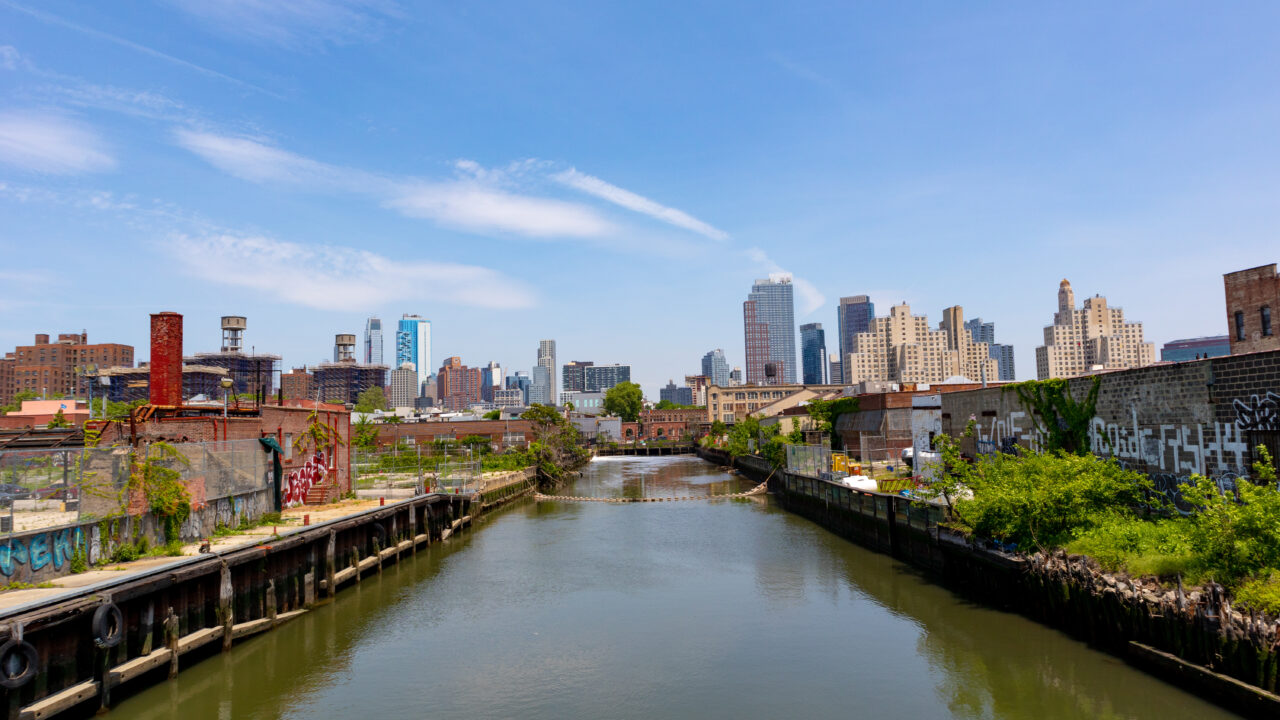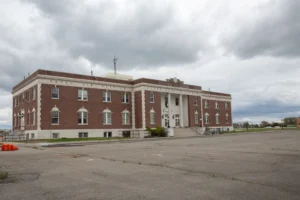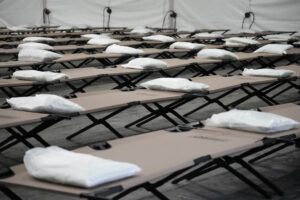New York City Fast-Tracks Migrant Shelter on Toxic Site
“Worst landlord” with history of speculating on shelter sites bought Third Street building last year. A view of the long-polluted Gowanus Canal, next to which the new migrant facility will be located. Image: Adobe
A view of the long-polluted Gowanus Canal, next to which the new migrant facility will be located. Image: Adobe
This story was originally published by THE CITY. Sign up to get the latest New York City news delivered to you each morning.
The Adams administration is now moving to open a 403-bed migrant shelter inside a manufacturing building alongside the long-polluted Gowanus Canal to be run by a group that only recently got into the shelter business.
The building at 130 Third St. sits in a zone highly contaminated with toxic materials, so much so that a city board in 2004 rejected residential conversion of the site over concerns about its proximity next to the canal and other highly toxic properties.
The Third Street migrant shelter will be run by BHRAGS Home Care, a non-profit group that had no contracts with the city to run shelters until October 2022 when DHS awarded them a $4.5 million deal to run an emergency migrant sanctuary in a former motel in Sheepshead Bay. Since then the group has won another 11 contracts totaling $188 million — all for migrant shelters, records show.
The planned shelter abuts the site where a gas manufacturing plant once stood and is across the street from two brownfield lots. All three properties have registered high levels of multiple toxins in their soil, some of which environmental officials believe have migrated onto adjacent plots.
Because of this, the state Department of Environmental Conservation (DEC) in October began requesting access to more than 300 properties in that area — including 130 Third St. — to perform what’s called soil vapor intrusion (SVI) testing in basements. Contaminants lurking in soil can turn into noxious vapor that seeps into buildings.
The building at 130 Third St. sits in a zone highly contaminated with toxic materials, so much so that a city board in 2004 rejected residential conversion of the site over concerns about its proximity next to the canal and other highly toxic properties.
“DEC identified several sites where volatile compounds were detected and have the potential for off-site soil vapor contamination,” DEC spokesperson Denis Slattery said, noting that the agency recently expanded its (SVI) investigation in the Gowanus Canal Area “to assess neighboring off-site properties for potential soil vapor intrusion.”
The former gas plant site is particularly contaminated. Already 80,000 tons of contaminated soil have been removed and 1.2 million gallons of tainted groundwater have been treated there, with more work ahead. In March DEC and the federal Environmental Protection Administration (EPA) asked the site’s owners, National Grid, to complete additional remediation work “to address the remaining contamination.”
Although it stands right next to the large area of the Gowanus district recently rezoned to allow for housing development, the plot designated for the shelter remains conspicuously zoned for manufacturing only.
Slattery said the DEC can only perform these tests if the property owner allows access to a building and that the agency last month requested access to 130 Third St. He would not reveal if that had happened there, citing the agency’s protocol to keep environmental testing results confidential to protect the privacy concerns of property owners.
During a recent visit to the site, THE CITY, observed work underway to transform the building into a shelter. A supervisor said he did not know if environmental testing had been performed at the site.
Last week the Department of Homeless Services (DHS), which is overseeing the project, declined to answer THE CITY’s questions about whether the owner had provided access to the site, whether SVI tests had taken place and, if so, what were the results.
The site currently has a temporary certificate of occupancy for use of the site as a business, not a residence, records show. In an email, DHS spokesperson Neha Sharma insisted the site would not be opened until it receives “an approved certificate of occupancy from the state.”
“As with all DSS-DHS facilities, we ensure that every site meets all [Department of Buildings], FDNY, and other relevant local/State regulations, and the agency has inspection processes in place to ensure that sites meet our standards before opening,” she wrote.
The issue of safety has emerged previously regarding migrant shelters and respite centers. In October the Fire Department in October tagged seven locations with vacate orders due to concerns about inadequate fire suppression systems.
Under the administration’s current plan for 130 Third St., the 74,000-square foot building will become a residential property within an area that remains zoned exclusively for manufacturing even after much of the surrounding area was rezoned to allow residential towers.
In fact, the building’s prior owner, Frank Shi-Fuh Ng, had in the past tried unsuccessfully to convert the building to residential. In a 2004 request for a zoning variance to the Board of Standards & Appeals, Ng argued that the area was eligible for residential development because the Gowanus Canal’s “primary use” was now for recreational — not industrial — purposes.
In a February 2004 ruling the BSA shot him down, writing that the board “disagrees with the assertion that the Gowanus Canal is now predominantly used for recreational use and concludes based on evidence in the record and its own observations that the use of the canal for such purposes is at most minimal and in its fledgling stages and that the canal, while cleaner than in the past, remains significantly polluted.”
A visit to the site last week revealed multiple signs along the canal a block from the Third Street site stating, “WARNING! – NO SWIMMING, NO BOATING, NO CRABBING and NO FISHING.”
These concerns about zoning and contamination evaporated under the pressures of the migrant crisis.
Already 80,000 tons of contaminated soil have been removed and 1.2 million gallons of tainted groundwater have been treated there, with more work ahead.
Normally overriding zoning restrictions for a private sector development requires the BSA’s approval. But the city Department of Buildings and Housing Preservation and Development approved the switch because of exceptions to the rules that allow for the creation of transient hotels if they’re run by non-profit groups.
In an Oct. 27 letter to the Department of Buildings, HPD Deputy Commissioner Annmarie Santiago said the agency “conditionally approves the creation of rooming units at the Premises” under a provision in the city Housing Code that restricts the location of SROs (single room occupancies) but allows them to open if they’re operated by a non-profit group.
In November the buildings department green-lighted a permit at 130 Third St. because the project is “exclusively for the public purpose of temporary housing assistance,” DOB officials said.
Though the Department of Homeless Services awarded the BHRAGS’ contract on an “emergency” basis and the designation of the manufacturing building for residential use was also justified due to an “emergency,” the property’s use as a shelter could continue long after the migrant emergency is over.
BHRAGS has signed a nine-year lease with the building’s owner, a limited liability corporation called 130 Third Street LLC, according to HPD. Asked about the nine-year lease, DHS spokesperson Sharma responded, “We can only speak to DSS-DHS specific contracts. DSS-DHS has a contract with the not-for-profit provider through 6/30/26 for a city sanctuary/emergency site serving asylum seekers in need of shelter.”
BHRAGS’ executive director, Roberto Samedy, did not return THE CITY’s calls seeking comment.
Sharma made clear the many obstacles the administration has faced finding housing for the unprecedented wave of migrants — what Mayor Adams has called an “onslaught” — swamping city shelters.
Since the spring of 2022, more than 157,000 asylum seekers have entered the city’s shelter intake system.
“Over 67,000 remain in the City’s care while hundreds more arrive each day, pushing our shelter system well past its breaking point,” she noted, repeating the mayor’s oft-repeated demand that the federal and state governments must provide support.
Fast Action
The 130 Third Street LLC is controlled by David Levitan and Yoseph Rabinowitz, property records show. Levitan made it on the city public advocate’s “worst landlords” list in 2015 and under his company, Liberty One, he’s long operated homeless shelters for the city that have racked up building and housing code violations, according to the New York Times.
Levitan did not return THE CITY’s call seeking comment.
The site currently has a temporary certificate of occupancy for use of the site as a business, not a residence, records show.
DHS noted that their contract was with the non-profit, not the landlord, and that the agency vets a provider’s track record before awarding a contract, checking “various aspects of an organization’s overall experience, integrity, and delivery of services, including performance reviews (spanning the organization’s history and in relation to the full scope of services they have provided), and reviews of the financial integrity and integrity of principals.”
Ultimately Ng sold the property to Levitan’s LLC in an unusually well timed transaction. Ng and Levitan entered into a contract of sale on June 12. Six weeks later, on July 26, DHS issued a letter notifying the community of its plan to use the facility as a “400-bed emergency city sanctuary shelter.”
As of this week, DHS’ contract with BHRAGS has yet to be signed and delivered to the city comptroller for registration. Because it’s an emergency contract, DHS did not have to seek competitive bids and instead relied on BHRAGS, a non-profit that has run other city shelters. The contract is still “in progress” so an estimated cost has not yet been revealed.
The Third Street shelter is set to open in “early 2024,” DHS officials say.
Your support matters…Independent journalism is under threat and overshadowed by heavily funded mainstream media.
You can help level the playing field. Become a member.
Your tax-deductible contribution keeps us digging beneath the headlines to give you thought-provoking, investigative reporting and analysis that unearths what's really happening- without compromise.
Give today to support our courageous, independent journalists.






You need to be a supporter to comment.
There are currently no responses to this article.
Be the first to respond.